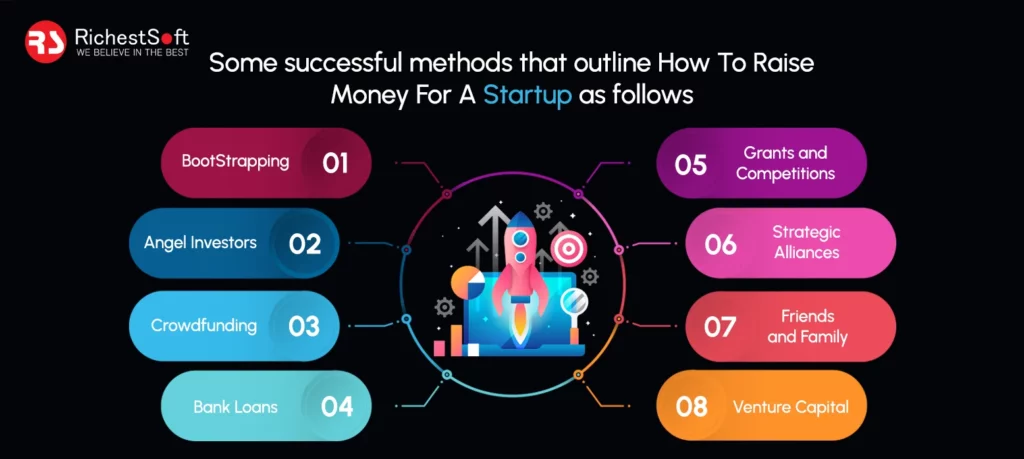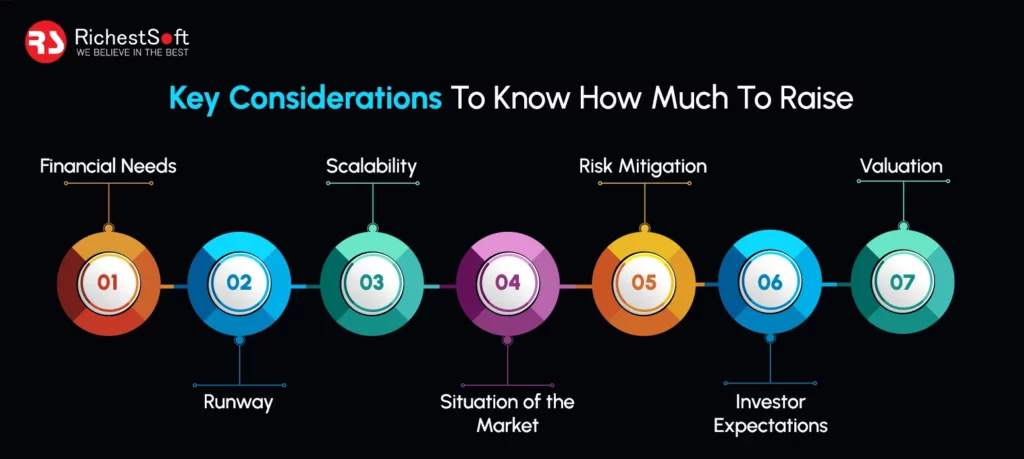October 16, 2024
Establishing a new business is a thrilling endeavor with lots of promise. However, some challenges are involved in realizing a company idea, such as getting the capital needed.
Raising capital for a company can be a fulfilling experience that lays the groundwork for future success.
Entrepreneurs looking to raise funds have various options in today’s fast-paced business world, each with certain advantages and things to remember.
Making your startup dream a reality may depend greatly on your ability to understand and develop excellent prototypes that present your business vision.
Over the past 15 years, RichestSoft has contributed to the startup ecosystem’s dramatic change by providing various prototype software development services. Why prototype necessary in mobile app development? These prototypes assist businesses in showcasing their business vision more effectively.
The possibilities are numerous and varied, from traditional techniques like bank loans and personal savings to new strategies like crowdfunding and venture capital.
As every funding source has needs, benefits, and potential drawbacks, entrepreneurs must carefully consider which best suits their company’s objectives, software development life cycle, and industry dynamics.
Kickstart your startup journey without losing control of your way to success with RichestSoft’s expert in custom app development services for your business’ prototype!

Pre-Requisite to Find the Investor for Startups
- Create a Solid Business Plan: Detail your app’s concept, market research, revenue model, and growth strategy.
- Develop a Prototype: Show a working prototype to demonstrate your app’s potential.
- Prepare a Pitch Deck: Highlight key points like the problem, solution, market size, business model, and team.
- Research Investors: Look for investors who have funded similar startups in your industry.
How To Raise Money For A Startup – Best Ways

1. BootStrapping
Using your savings, the money your company makes, or money you borrow from friends and family to finance your startup is known as bootstrapping.
Even if it could necessitate resourcefulness and thrift, bootstrapping gives you complete control over your company and spares you from paying outside investors for debt or equity.
2. Angel Investors
Angel investors are those who lend money to start-ups in return for convertible debt or ownership shares. In addition to money, they frequently invest in startups and can provide invaluable knowledge, contacts in the business world, and mentoring.
Elevate your startup to new heights with the backing of angel investors. Explore our expert AI chatbot development solutions to attract the right investors through your demo product for your vision.
3. Crowdfunding
Business owners frequently raise money from many people through websites like Kickstarter, Indiegogo, and GoFundMe in exchange for pre-orders or other benefits.
Crowdfunding allows you to raise early-stage financing without giving up ownership, validate your idea, and create buzz.
4. Bank Loans
Traditional bank loans are a popular source of finance for firms with strong credit histories and collateral.
Even though bank loans have predictable payback terms and relatively low interest rates, obtaining one might be difficult for startups without a track record.
5. Grants and Competitions
Many firms, nonprofit organizations, and government agencies host grants and competitions to encourage entrepreneurship and creativity.
These funds are desirable for businesses, particularly those with a social mission because they usually don’t need payback or equity.
6. Strategic Alliances
Forming alliances with well-known businesses or groups can open doors to capital, assets, and knowledge.
Strategic alliances can reduce risks and speed growth for startups, and they can take many forms, including co-development initiatives, license agreements, and joint ventures.
7. Friends and Family
Many entrepreneurs first turn to their friends and family when looking for capital.
Even if their company is still in its infancy, these people might be more eager to fund their idea. But it’s important to approach these connections professionally and be very upfront about the hazards.
8. Venture Capital
Companies that invest in high-growth enterprises with the potential for large profits are known as venture capital firms.
Venture capital often has strict conditions, such as a strong company plan, scalable model, and potential for a high return on investment.
Even though it is the best way to get funding for a startup, it provides support in many ways for quick expansion.
Ready to scale your startup with substantial investment? Partner with us for top-notch blockchain development services that attract venture capital firms.
Things To Ensure When Raising Money for a Startup
There are a few key factors to consider when considering how to get funding for your startup.
Make sure everything goes according to plan and positions your business for success:
1. Clear Business Plan
In a concise and attractive business plan, state your firm’s goal, target market, unique value offer, revenue model, and growth strategy.
Investors often want a detailed plan outlining how their money will be used to produce measurable outcomes.
2. Financial Projections
Create accurate financial forecasts that show the possibility of increasing income, making a profit, and getting a return on investment.
Make careful assumptions and include thorough explanations of all costs, sources of income, and KPIs.
3. Legal and Regulatory Compliance
Ensure your fundraising efforts meet all applicable laws, rules, and securities requirements.
Seek legal advice to ensure that your fundraising round is correctly structured, that investment paperwork is drafted, and that any reporting or disclosure requirements are met.
4. Terms and Valuation
When negotiating the terms of your fundraising round, consider several elements, including governance rights, dilution, ownership of equity in the company, and liquidation preferences.
Achieve equilibrium between optimizing valuation and safeguarding equity for subsequent funding rounds.
5. Due Diligence
Conduct extensive due diligence on prospective investors to ensure they are trustworthy, share your company’s goals and values, and can offer strategic value in addition to financial support.
Similarly, investors will investigate your business, so be ready to respond to inquiries and send over necessary data as soon as possible.
6. Transparency and Communication
Throughout the numerous ways to raise capital for a company, such as keeping lines of communication open and transparent with investors.
Respond to investors’ questions and concerns and update them on developments, difficulties, and milestones.
Why Do Startups Require To Raise Money?
Fundraising is necessary for startups for several core reasons, all essential to their expansion and long-term viability.
Although the precise requirements may differ based on the type and stage of the company, the following are some of the main causes of startups looking for outside funding:
➡️ Production
A new digital product engineering services or development frequently necessitates a large financial outlay.
This covers the price of developing, testing and refining the product to ensure it satisfies regulatory requirements and market demands.
Startups may find it difficult to realize their ideas without sufficient capital.
➡️ Working Capital
Sufficient working capital is necessary to ensure liquidity and manage the company’s daily operations. Startups may need funds to cover short-term obligations, manage cash flow, and keep inventories.
The working capital required to keep the company operating efficiently can be obtained through outside finance.
➡️ Operational Costs
Salaries, rent, utilities, and other operational costs are only a few of the costs of running a business. In their early phases, startups might not make enough money to pay these costs.
Apart from finance, this difference keeps the company running smoothly until it can support itself.
➡️ Scaling
Scaling up operations is the next step for a startup after it has proven its business plan and experienced some initial success.
This could entail growing the number of distribution channels, breaking into new markets, or enhancing production capacity.
Significant funding is needed for scaling, which entrepreneurs can raise through fundraising.
➡️ Infrastructure and Technology
Startups frequently depend on cutting-edge infrastructure and technology to run effectively and stay competitive.
This involves purchasing hardware, software, cloud computing services, and other tech-related items.
Startups can invest in technology to support their operations and growth by raising capital through fundraising.
➡️ Building Market Exposure
Startups must establish market traction and validate their business proposition before making significant income.
This may entail providing free trials, discounts, or pilot initiatives to attract early adopters.
The resources needed to carry out these plans and obtain the required market validation are provided by funding.
How Do Businesses Know When To Raise Money?
Choosing when to raise money is crucial for startups because doing so at the wrong time can greatly impact the business.
Businesses can use the following factors to decide when it’s appropriate to raise capital:
➡️ Market Opportunity
It may be appropriate to raise money if there is a definite demand in the market for your good or service and you need more money to seize the opportunity.
➡️ Proof of Concept
It’s critical to show that your business concept is viable and can grow. If your company idea has proven successful, you are gaining traction, and users are giving you favorable feedback, now might be the right time to look for finance to help your firm develop faster.
➡️ Strategic Milestones
Determine particular benchmarks that, if met, will raise your company’s worth considerably. These could be benchmarks for creating new products, hitting a specific income or user base, or forming important alliances.
Rallying capital to hit these benchmarks can raise the value of your business and make it more appealing to potential investors.
➡️ Financial Needs
Assess your projected cash flow requirements and existing financial status.
If you expect a financial constraint shortly due to planned expansion, increased marketing activities such as marketing services for startups, or operating expenses, begin fundraising as soon as possible to prevent running out of resources.
➡️ Investor Interest
If prospective investors are interested in your business idea or getting questions about investment options, the market may be open to your proposal.
By taking advantage of this interest and starting a fundraising campaign, you can obtain financing on terms that work for you.
➡️ Team Expansion
As your company expands, you might need more personnel or programmers for startups to support operations, sales, marketing, and product development.
Fundraising can provide the means to hire top personnel and assemble a solid team to propel further expansion.
Transform your startup vision into a reality with RichestSoft. From expert mobile app developers to leading AI integration services, we’ve got the expertise to support your journey.
Key Considerations To Know How Much To Raise Money?
A crucial choice that needs to be well thought out is how much money to raise for your startup or firm. When determining the sum, bear the following considerations in mind:

1. Financial Needs
Assess your business plan and financial forecasts to ascertain the capital needed to meet your short—and long-term objectives. Consider marketing, hiring, scaling, startup product development, and operating costs.
2. Runway
Determine your runway or the duration for which your firm can function on the raised money before taking more money. Aim to acquire enough money to create a comfortable runway, usually at least 12–18 months, to enable ample time for business growth and reaching milestones.
3. Scalability
The scalability of your business concept is an important consideration. Your company might require more initial funding if it has the potential to grow quickly to support growth and seize market possibilities.
4. Situation of the Market
Consider the market’s state and investors’ attitudes. If the market is strong and investor demand is high, you can obtain extra funding on advantageous terms.
5. Risk Mitigation
Consider all possible risks and uncertainties that can impact your company. It is wise to raise enough money to cover unforeseen difficulties or delays in reaching goals.
6. Investor Expectations
Consider what your investors anticipate being required in funds for you to carry out your business plan successfully. Communicate openly about your financial situation and the intended use of the money raised.
7. Valuation
Calculate a reasonable startup valuation by considering the company’s growth potential, industry benchmarks, and revenue expectations. Refrain from overvaluing or undervaluing your business since this could impact investors’ interest and the effectiveness of your fundraising initiatives.
Conclusion
A startup’s business plan and strategic objectives are just a few of the many important considerations when deciding to raise funds.
You may ascertain the ideal funding to secure your business’s expansion and prosperity through comprehensive financial planning and evaluation of this crucial information.
If you’re also looking to raise a good amount, then it’s important to develop an excellent prototype of your application or project that adds value.
Here at RichestSoft, we provide entrepreneurs with the best web development services for prototypes to assist them in successfully navigating the fundraising process.
We realize how difficult it can be for companies to raise money. Our team of full stack developers offers assistance at every stage of the development phase of the prototype, regardless of whether you’re trying to secure seed money, Series A finance, or strategic investment.

 +1 315 210 4488
+1 315 210 4488 +91 99888 06489
+91 99888 06489






